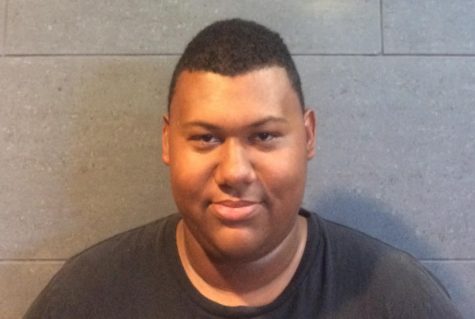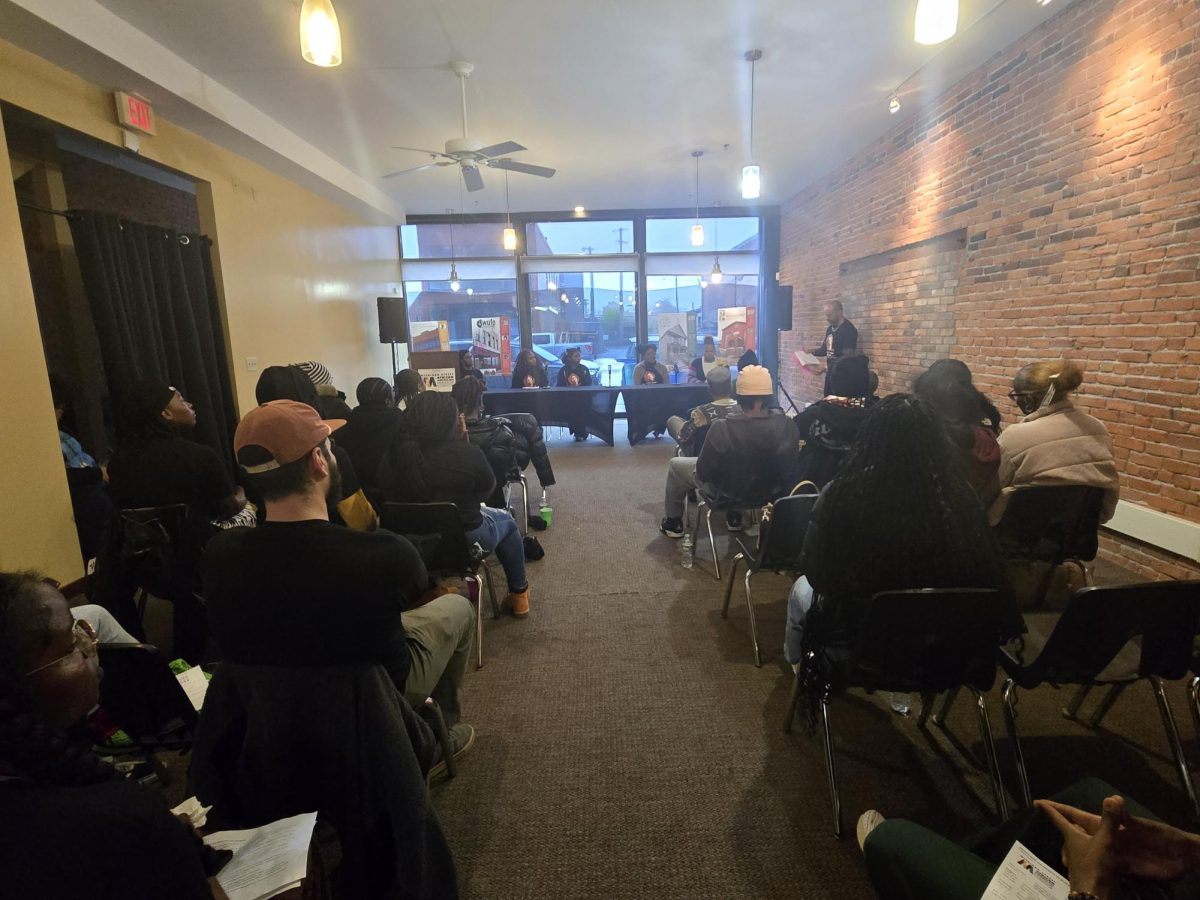Do sitcoms have a future on television?
May 8, 2018
Television has always been evolving. Since the days of The Honeymooners, to the current era of streaming being a dominant force in how people consume media. While many shows that dominate the airwaves are dramas relating either to politics or comedy-dramas centering on the condition of a family dealing with a certain revelation.
While I wasn’t alive to see many of the shows I love on the air; I do know that those were the golden years. Since then sitcoms are considered out of fashion, and for good reason. Many plot lines in current sitcoms are quite dry and rely solely on jokes relating to the current political climate, promiscuity, or copious drug use.
So many shows seem to be concerned with trying to be the next Friends, that the fail to really wrap their head around being original. One sitcom that faced this problem was Unhappily Ever After.
Sold to The WB as “Divorced… with Children”, a different version of the hit FOX series, Married… with Children, this was one of the show to be at the time because of its comedic qualities. However, the show is consistently considered one of the worst shows of all time because of its alarming similarities to Married with Children.
After the first season, the show deviated from its original concept and had the married couple in question getting back together instead of getting a divorce. After a while, one of the show’s leads, Stephanie Hodge, was killed off of the series but returned later in the same season alive. Finally, she left the show permanently with her character running off with a woman.
Sitcoms that steer away from the original premise of the show can often make viewers feel like they’re watching a romantic comedy drama. One example of this is the NBC sitcom, Just Shoot Me!. This show’s plot was about a young woman who is forced to work at her father’s fashion magazine when no other new outlet will hire her because she made an anchorwoman cry on the air.
However, after season two the show began to delve into the characters dating lives more than the original concept. Thought the quality of the comedy remained the same, this show’s quality depleted because it stopped using its original angle of comedy.
More often than not, this can happen to workplace comedy shows but in changing their plot Just Shoot Me! was one of three shows that laid the groundwork for show like The Office, 30 Rock, Parks and Recreation, yet they are hardly ever remembered. The other two are ABC’s Spin City with the original of the three being NBC’s NewsRadio.
NewsRadio, featured the struggles of news director Dave Nelson, played by Dave Foley, as he oversees the staff of WNYX, the second highest rated news station in New York. The zany staff causes Dave problems from exploding gelato to removing all the furniture from the office. This show was amazing but after the fourth season aired, a tragedy struck the show that it barely recovered from.
Compound that with a deadly interview given to Rolling Stone by series creator, Paul Simms, about NBC’s Must See TV Thursday lineup, and a program director with a hatred for this show; NewsRadio was a sinking ship that would meet an ugly demise.
NewsRadio can be described as the Seinfeld of workplace comedies. Using short episode titles, the main theme of each episode drove the plot and can usually tie some of the storylines together in the end. One example of this is the season 4 opening episode, Jumper.
This episode deals with a man who was fired from his job threatening to jump from the building where WNYX is located unless he can read a statement on the air. Much of the episode is spent discovering how the characters of the show would react in this situation. While reading his statement, it’s revealed that the man was fired from WNYX’s parent company, Jimmy James Incorporated, owned by eccentric billionaire Jimmy James, played by Stephen Root.
Other episodes used hidden humor to make some inappropriate jokes. In the season 3 episodes, Rose Bowl, Mr. James buys a bunch of fake movie memorabilia and the staff takes time to tell him what is wrong about the items. Among the items is “the beaver” from Basic Instinct.
Subtle humor in the show worked so well but didn’t work with audiences. The show was taped live but many audiences don’t quite get the quick wit that Paul Simms was giving people. However, shows that came after NewsRadio like Spin City, and Just Shoot Me! would be served well by using the same essential character typology and that style of workplace comedy.
Relationships are often a big point of workplace comedies and NewsRadio was no exception. Yet, they were. Most relationships in sitcoms developed over time, beginning as innocent flirtation and becoming intimate liaisons. This was not the case for Dave and Lisa, the primary romantic entanglement on NewsRadio.
Lisa Miller, played by Maura Tierney, viewed herself as the next news director instead of Mr. James hiring an outsider like Dave. She is instead relegated back to her role as WNYX’s senior reporter/associate producer. She and Dave must deal with a crisis of Matthew, WNYX’s other reporter, played by Andy Dick, mispronouncing the name Buttafucco on air in the worst possible way.
While they are having dinner to discuss just how to handle this situation, they have sex. Most television relationships were based off the tried and safe “Sam & Diane” relationship people remember from NBC’s earlier hit, Cheers. This method means resisting the feelings you have for that person and finally giving in after a few seasons.
Dave and Lisa sleeping together provided a newer comedy sense that allowed for numerous plotlines involving the two and how it affected their work around the office. Since then, however, not many shows have considered using this formula, the only exception being, Young and Hungry. Instead other shows focus on the “Ross and Rachel Formula”.
Many shows use “the chase” relationship formula to not only keep viewers interested but to also make them want more from the lead characters, even if they aren’t in a relationship. Frasier is most well known for this.
Throughout the entire series, the B-story line is that Frasier’s brother Niles Crane, played by David Hype Pierce, is in love with the physical therapist that Frasier hired to take care of his father, Daphne Moon, played by Jane Leeves. Sitcoms are plagued with a loss of their original plots in favor of pursuing a romantic plot line, in order to keep up with their dramatic or soap opera competitors.
I guess that’s what people want to see in sitcoms, the drama of a primetime soap opera with the comedy of a comedy/drama. People’s comedy is being filled with the side humor implemented on many shows that have a great connotation with dramatic writing.
Since the departure of Elliot Stabler, played by Christopher Meloni, from the hit police procedural, Law & Order: Special Victims Unit, the chemistry between characters has gone down because no one else has given viewers the “bad cop with a heart of gold” that Stabler was. Instead, the characters are now reliant on comedy in lieu of Stabler and Benson’s intense conversations.
Television now consists of a few good shows, but a many of them are revivals that are based on the current political climate. Shows like Will & Grace and Roseanne have remained in the public eye because they remain controversial in terms of their jokes. One show that is also making what can be considered a politically charged comeback is the classic, Murphy Brown.
Murphy Brown is one of those show that once again doesn’t necessarily need to comeback but will because there is just nothing else to put on the air, but will comeback swinging at President Trump. This would be something that people champion and view as a means for tying the score between journalists and President Trump.
While many revived sitcoms have the same cast only dealing with our current battery of social and political issues, one show that has done something different is Netflix’s One Day at a Time. This show deals with the life of the Alvarez family as they work to assimilate their Cuban heritage with American ideals. The show specifically centers on how mother, Penelope, played by Justina Machado, deals with certain situations.
A veteran and nurse, Penelope has troubles as season one deals sees her start taking antidepressants for her PTSD, her daughter coming out as a lesbian and her ex-husband coming back into her life only to wreak havoc on her life. Almost every episode of this show can cause you to shed a tear. However the laughs on this show mesh into the scene but there aren’t enough of them to justify this show being a sitcom. Often times they can disrupt the profound monologues or heartfelt conversations between characters.
In this case, the jokes seem to interrupt the flow of certain scenes while at the same time they are the only things keeping the show labeled as a sitcom. Other than that, it becomes just another watered down comedy-drama. While the show is labeled a comedy-drama now, the show is still considered a sitcom as well.
In this case a watered own comedy-drama is when a sitcom that has some good jokes leans heavily on the dramatic scenes of the show. This can relate back to certain shows getting overly involved in the romantic angle of the show. Some shows like this would be Just Shoot Me!, Spin City, The Nanny, but the biggest offender of doing this is The WB sitcom, What I Like About You.
Being the first show to feature Amanda Bynes since The Amanda Show ended and gave viewers a chance to see her in an adult role, this show dealt with the lives of the Tyler sister, chaotic though lovable Holly, played by Bynes, and her guardian and endearing older sister Val, played by Jennie Garth, as they live together after their father is forced to move to Japan for his job. The overall first season of the show deals with the two sisters learning to live with each other and whatever weird habits they have. This was abandoned for the remainder of the shows run.
Instead the show began to focus intensely on how Holly was having trouble deciding on whom she loved. The show focused on Val and her friend Lauren, played by Leslie Grossman, only briefly but still gave them scenes worthy of comedy gold. Amanda Bynes being the great comedienne that she is was given more dramatic scenes and the show slowly becomes somewhat of a deranged soap opera parody.
Another show that was notorious for this was The Nanny. Despite having some humble beginnings, after season 3, this show began to focus heavily on the budding romance of Maxwell Sheffield, played by Charles Shaughnessy, and Fran Fine, played by Fran Drescher. The final season of the show even featured their married life, a storyline that was written to give the show an extra season on the air.
The reason sitcoms have become overly reliant on drama can has a two-part answer to it. The first part is the most important in that the dramatic elements leave the viewer wanting more from the show. One example of this is Sabrina, the Teenage Witch.
During season four of this sitcom, Sabrina, played by Melissa Joan Hart, broke up with her boyfriend, Harvey Kinkle, played by Nate Richert. She movies on to dating a college student named Josh. Similar to What I Like About You, this show used the relationship angle to keep the show going, at the cost of remaining true to the comedic formula of the show that made it successful.
The second part of the answer is that some shows try to avoid getting into a pattern. Again, let’s take a look at The Nanny for this example. Several episodes, starting in the latter half of season two and continuing through most of season three and eventually being sprinkled throughout the show, focused on Fran interfering in Mr. Sheffield’s business life in a desire to meet whatever celebrity was guest starring on the show. While some formulas for sitcoms work, like Seinfeld, Murphy Brown, Kenan and Kel, and a variety of others, some shows dread becoming the same episode over and over again.
Unless a relationship is considered funny, or you can make a show rely on jokes specifically about social and political issues, sitcoms have lost their ability to be based in humor. The era of genuine comedy is gone. The real proof of this comes in the form of the former CBS sitcom, 2 Broke Girls.
2 Broke Girls was the closest thing we had to a sitcom that actually had potential to bring the dying genre back to life. 2 Broke Girls was about Max Black, a poor waitress living in Williamsburg, and Caroline Channing, a former billionaire who moves in with Max after her father is found guilty of committing a Ponzi scheme. The show chronicles their lives while they work at the Williamsburg Diner and how they try to start their own cupcake business.
Many people have criticized the show or its use of overly sexually comedy, but it details the lives of so many people today. The show’s primary demographic are people who are in college or young adult males. One criticism of the show is that despite making an effort to break into other branches of comedy, their efforts fell flat, as many of their jokes were increasingly reliant on current events to retain laughs. While the show was able to break away from this and develop a life of its own, it was cancelled before viewers really got a chance to see what their new life could have been like.
Another criticism of sitcom is the use of laugh track to generate the illusion that certain jokes are actually funny. New York magazine ran an article about the use of laugh tracks. The article is both critical of shows that use it to make jokes sound better in a method called sweetening. Much of the article delves into the way laugh tracks have been used to create the illusion that a joke received a higher amount of applause than usual.
2 Broke Girls used this method, sweetening, but other shows like How I Met Your Mother would use a laugh track strictly for certain jokes. Other times, laugh tracks have been used to blend the applause from certain takes of a show. In describing a typical production week on Seinfeld, Jason Alexander, spoke about their unusual use of a laugh track to do this, but not to create an added laugh for the jokes throughout the series.
Maybe that’s the problem with sitcoms, they are being passed up in favor of show that will be ratings magnets. If so, that definitely explains why something like The Big Bang Theory are still on the air despite the comedy being stale. Sitcoms can become big hits but the real question is to know when they should end. One of the primary reasons that Seinfeld is better than Friends is because it ended just as people were over seeing these characters. Jerry Seinfeld turned down a great deal of money that was offered for him to bring Seinfeld back for a tenth season.
However, shows like Friends, Two and a Half Men, and Spin City ran way longer than they should have because they were doing amazing in the ratings. Two and a Half Men and Spin City diminished in quality because the original lead actor left the show, and was replaced by someone whose comedy wasn’t on par with what the show’s tone dictated.
Friends, however, once again got lost in finding out what it was even about because it was a combination of attempting to mix Seinfeld with the FOX hit series Living Single. Somewhere along the way, this show lost hat it was originally about and instead tried to mirror these two shows and ultimately was successful in doing so. The show, however, is not as praised as it was then.
Since it has gone off the air, many people are starting to realize just how unattainable being able to live like the characters on Friends really is. Not many sitcoms are criticized for this, but shows like Friends and Seinfeld have been met with a great deal of speculation because of how they are portrayed.
In an article for City Lab, writer Brentin Mock describes how people can view the gentrification of New York City in the 1990’s by comparing the sitcoms Living Single and Friends. These shows both present the same plot but in different fashions. Living Single doesn’t have a third place, either the characters are at work, maintaining jobs they hold throughout the series, or they are at home in apartments they could afford.
The characters of Friends, however, would usually hang about at Central Perk, the shows’ iconic coffee shop, or they were at their apartments, or the various jobs they would hold throughout the show. In the end, as Mock puts it, “If you were a black young adult living in an expensive city like New York, you needed to be an urban professional; if you were white, you could survive on creative loafing.”
Sitcoms also face issue with the timeslot they are given. NewsRadio struggled with being moved a total of 11 times throughout its five season run. In doing this, it can explain why the show never really found an audience and didn’t last as long as it should have. Maybe that’s why sitcoms turn out to flop when they should be huge successes, they don’t find their ideal audience.
Certain shows like this would be the show that can be considered the original 2 Broke Girls, which starred Lori Petty and Karyn Parsons, better known for playing Tiffany Banks on The Fresh Prince of Bel-Air. The show was called Lush Life and centered on Parson’s character, Margo, moving in with Petty’s character, a bohemian artist and fellow lush named George, after she discovers her husband had an affair.
Despite having a great plot, for it’s time, the show was cancelled after only four episodes with the other episodes not even being burned off in the summer time. Other shows that follow this pattern would be Love & Money, The Trouble with Normal, Bette, and Whoopi. One notable exception from this would be the sitcom, High Society, which failed to be the American version of the British sitcom, Absolutely Fabulous, which centers on the lives of two women missing a social conscience. Along with High Society, one other show dared to be something similar to this show, but managed to be just different enough to maintain some degree of success, Cybill.
Described as a look at what Cybill Shepard’s career would have been without the success of The Last Picture Show or her earlier crime-drama series, Moonlighting, this sitcom told the story of the twice-divorced actress, Cybill Sheridan’s attempts to make it in show business as an older woman. Accompanying her in her usual madcap journeys or helps her get into trouble is her best friend and wealthy, though bitter divorcee, MaryAnn Thorpe, played by Christine Baranski.
Along with High Society, this show was American television’s attempt at finding something that could be as campy and hilarious as Absolutely Fabulous, without being on a cable channel. However, they failed, as Cybill lasted four seasons, finishing with a cliffhanger ending. Since then no show has really been able to come close to mirroring the insanity that was Absolutely Fabulous.
Many shows that are filmed in the multi-camera format rely on being very similar to shows has become a prevalent phenomena. The real question is whether or not this is a bad thing? Many people criticized the show Mulaney for being way too similar to Seinfeld.
However, Seinfeld’s iconic slice of life, “nothing” concept was brilliant for comedy at the time. What few people remember is that the show was about where a comedian gets his inspiration. Mulaney was similar to Seinfeld in that the main character was a stand-up comedian trying to make it in New York City and there were some bits of stand-up comedy performed throughout the show. Aside from this, Mulaney had a somewhat different premise.
Many shows display “everyday life” aren’t really able to resonate with viewers because more often than not the plot of the show can seem way too farfetched. Not everyone will find him or herself attempting to pull a golf ball from a whale’s blowhole, Seinfeld was able to tap into the collective consciousness of society.
One way the sitcom genre has made a comeback is through the single camera setup. Shows like Don’t Trust the B—- in Apartment 23, The Office, 30 Rock, Black-ish, Parks and Recreation, Malcolm in the Middle and many others have brought abut interest in this genre. However, the traditional multi-camera setup is on the brink of extinction.
Television has gone down in quality but nothing compared to that of the sitcom. If only, sitcoms could remain true to the plots and ideals they were created with, demonstrate the reality of life instead of the perception and give us what we want instead of what the ratings need, we might be laughing a lot more.
And with the current problems in society, sometimes a good laugh serves as a brilliant distraction.





